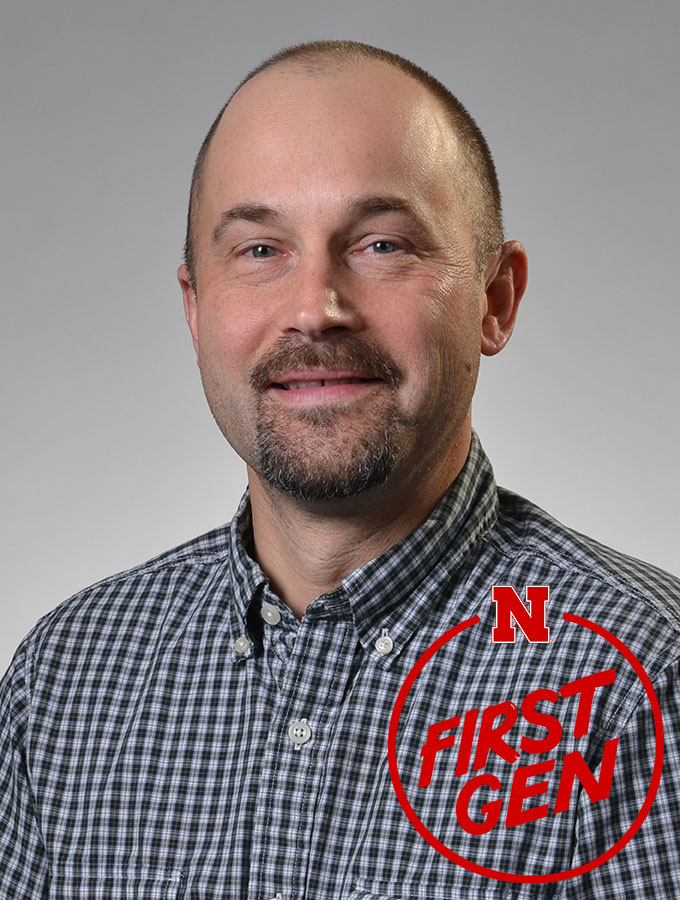
Corey Rumann Assistant Professor of Practice
Ph.D., Educational Leadership with emphasis in Higher Education, Iowa State University, 2010
M.A., Counselor Education with emphasis in Student Affairs, University of Wyoming, 1998
B.A., Psychology, University of Wyoming, 1991
he/him/his
Dr. Corey Rumann is an assistant professor of practice who teaches and advises primarily in the student affairs graduate program. Corey has taught courses both online and face to face. Currently, Corey teaches courses focusing on an introduction to student affairs, college student development and helping skills for higher education professionals and student affairs educators. Social justice, equity and inclusion have a major influence on how Corey approaches teaching and they believe personal reflection is key to learning. Corey’s past research efforts focused on college student veterans and military service members and their transitions to college. Corey is co-editor of the book Called to Serve: A Handbook on Student Veterans and Higher Education.
Areas of Expertise
- Student Veteran Identity Development.
- Application of helping skills in the student affairs profession
- College student development
- Rumann, C. B. & Bondi, S. L. (2015). Engaging student veterans inside and outside the classroom. In S. Quaye & S. Harper (Eds.), Student engagement in higher education: Theoretical perspectives and practical approaches for diverse populations (2nd ed.).
- Hamrick, F. A. & Rumann, C. B. (2012). Addressing the needs of women servicemembers in higher education, On Campus with Women, 40(3).
- Hamrick, F. A. & Rumann, C. B. (2011). Women servicemembers and veterans returning to colleges and universities: An exploratory analysis. PowerPlay: A Journal of Educational Justice, 3(2).
- Rumann, C. B. (2010). Supporting student veterans in higher education. Developments, 8(2).
- Rumann, C. B. & Hamrick, F. A. (2010). Student veterans in transition: Re-enrolling after war zone deployments. The Journal of Higher Education, 81(4), 431-458.
- Gildersleeve, R. E., Rumann, C. B., & Mondragón, R. (2010). Serving undocumented students: Current law and policy.In J. Price (Ed.) Understanding and supporting undocumented students. New Directions for Student Services, no. 131 (pp. 5-18). San Francisco: Jossey-Bass.
- Hamrick, F. A. & Rumann, C. B. (Eds.). (2013). Called to serve: A handbook on student veterans and higher education. San Francisco: Jossey-Bass.
- Minnis, S., Bondi, S., & Rumann, C. (2013). Focused Learning Environments for Student Veterans. In F. Hamrick & C. Rumann (Eds.), Called to serve: A handbook on student veterans and higher education. San Francisco: Jossey-Bass.
- Porter, S., Rumann, C.B., & Pontius, J. (2011). The validity of student engagement survey questions: Can we accurately measure academic challenge. New Directions for Institutional Research, San Francisco, CA: Jossey Bass.
- Rumann, C. B. (2009). Going to bat for your students. In F. A. Hamrick & M. Benjamin (Eds.), Maybe I should…Case studies on ethics for student affairs professionals (pp. 43-44). Lanham, MD: University Press of America.
- Rumann, C. B. & Hamrick, F. A. (2009). Supporting student veterans in transition. In R. Ackerman & D. DiRamio (Eds.), Creating a veteran-friendly campus: Strategies for transition and success. New Directions for Student Services, no. 126 (pp. 25-34). San Francisco: Jossey-Bass.
- Rumann, C. B., Rivera, M., & Hernandez, I. (2011). Student veterans at community colleges. In E. Cox & J. Watson (Eds.).Marginalized students: The view from the community college periphery. New Directions for Community Colleges, no. 155 (pp. 51-58). San Francisco: Jossey-Bass.
- Rumann, C. B. & Shelley, M. C. (2006). Science writing heuristic: Second-year grant evaluation. Research Institute for Studies in Education. Ames, IA: Iowa State University, Research Institute for Studies in Education.
- EDAD 880: Seminar: Student Affairs
- EDAD 879: Introduction to Student Affairs
- EDAD 840: College Student Development
- EDAD 843: Counseling Principles for Educational Administrators